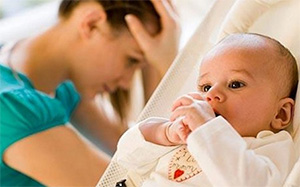Understanding Perinatal Mood Disorder
Goal
To understand what pre/postnatal depression is and how it develops.
What is Perinatal Mood Disorder? (U.S. Department of Health and Human Services, pp. 3-9)
Depression or anxiety during or after pregnancy refers to a broad range of physical and emotional struggles that many women face and can range in severity from mild to severe. It can occur during pregnancy or within a year after the end of a pregnancy. Without help, symptoms may last a few weeks, months, or even years.
 Postnatal depression. About 1 in 8 women suffers from postnatal (postpartum) depression. Symptoms can begin at birth or any time in the first year after giving birth. It is more severe than your basic “baby blues” that often occur during the first few days after delivery. “Baby blues” typically include crying, worrying, sadness, anxiety, mood swings, trouble concentrating, difficulty sleeping, and not feeling yourself. With time, patience, and the support of family and friends, symptoms linked with “baby blues” will usually disappear within a few days or within 1 to 2 weeks. If they don’t, it may be a sign of a bigger problem requiring additional help.
Postnatal depression. About 1 in 8 women suffers from postnatal (postpartum) depression. Symptoms can begin at birth or any time in the first year after giving birth. It is more severe than your basic “baby blues” that often occur during the first few days after delivery. “Baby blues” typically include crying, worrying, sadness, anxiety, mood swings, trouble concentrating, difficulty sleeping, and not feeling yourself. With time, patience, and the support of family and friends, symptoms linked with “baby blues” will usually disappear within a few days or within 1 to 2 weeks. If they don’t, it may be a sign of a bigger problem requiring additional help.
Prenatal depression. Pregnant women commonly face a large number of challenges including morning sickness, weight gain, and mood swings. Some symptoms are dismissed as being “just part of pregnancy,” such as feeling really tired, appetite changes, and poor sleep but if things done every day are affected, help is likely needed. Whether the pregnancy was planned or unexpected, the changes that a woman’s body and emotions go through during pregnancy are very real-and so are the risks of prenatal depression.
Common symptoms associated with pre/postnatal depression for the mother include the following:
- Sad feelings
- Feeling very anxious or worrying too much
- Being irritable or cranky
- Trouble sleeping (even when tired) or sleeping too much
- Trouble concentrating or remembering things
- Trouble making decisions
- Loss of interest in caring for yourself (e.g., dressing, bathing, fixing hair)
- Loss of interest in food, or overeating
- Not feeling up to doing everyday tasks
- Frequent crying, even about little things
- Showing too much (or not enough) concern for the baby
- Loss of pleasure or interest in things you used to enjoy (including sex in the prenatal period)
For infants, the effects of pre/postnatal depression can be serious. There is a greater chance of babies arriving too small or too early or having problems in learning and behavior as they grow older.
What Causes Perinatal Depression? (U.S. Department of Health and Human Services, pp. 5-7)
There are a number of reasons why women may get depressed during the transition into motherhood. A woman’s body undergoes many changes during and after pregnancy that can contribute to mood swings. Additionally, a new baby changes sleeping schedules, lifestyles, and relationships with others. In addition, new mothers often experience a lot of pressure to be the “perfect” mother.
It doesn’t matter how old the woman is nor their race, income, culture, or education. Pre/postnatal depression can affect women from a variety of backgrounds and is considered to be a health problem. Thus, it is not the woman’s fault if they find themselves feeling this way. However, having an unplanned pregnancy, a family history of depression or bipolar disorder, a history of alcohol or drug abuse, a recent stressful event, relationship or financial problems, or a previous pregnancy with pre/postnatal depression can increase the likelihood of it developing.
Assessing for Depression Exercise (U.S. Department of Health and Human Services, p. 11)
Instructions: Only a trained health care or mental health professional can determine whether someone has pre/postnatal depression. However, the following checklist can helpful in identifying some of the common symptoms-reflecting on the past week or two. Read through the items.
- I have been unable to laugh and see the funny side of things.
- I have not looked forward to things I usually enjoy.
- I have blamed myself unnecessarily when things went wrong.
- I have been anxious or worried for no good reason.
- I have felt scared or panicky for no good reason.
- Things have been getting the best of me.
- I have been so unhappy that I have had difficulty sleeping.
- I have felt sad or miserable.
- I have been so unhappy that I have been crying.
- The thought of harming myself, my baby, or others has occurred to me.
If a woman completes this checklist and endorses more than one item, they are encouraged to seek help to determine if they are indeed suffering from pre/postnatal depression and to receive support.
Next Step
Watch the following video to learn more about postnatal (postpartum) depression:
